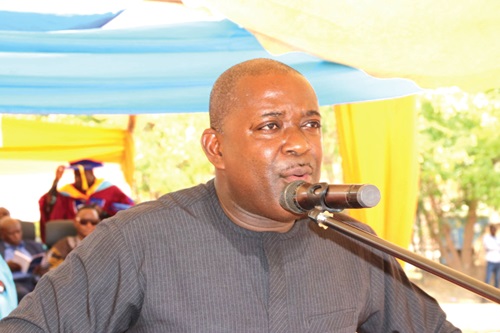The Director-General of GTEC, Professor Ahmed Abdulai Jinapor, said the proliferation of satellite campuses of most universities with charters was negatively affecting the growth and development of technical universities.
“It is of no surprise that in a school like Bolgatanga Senior High School, there can be about five different traditional universities running distance education programmes for students,” he said.
12th congregation
At the 12th congregation of the Bolgatanga Technical University (BTU) last weekend, Prof. Jinapor said the springing up of satellite campuses was an impediment to the progress of technical universities.
In all, 628 students, made up of 328 males and 300 females, were awarded with Bachelor of Technology, Higher National Diploma (HND) and Professional Diplomas.
Background
Without recourse to GTEC, a number of traditional universities are operating satellite campuses in SHSs and on unapproved premises, thereby lowering the standard of education.
To remedy the situation, GTEC has signed a memorandum of understanding (MoU) with Vice-Chancellors of the affected universities towards the cessation of the practice. A four-year period has been agreed upon for the universities to phase out the students who have already been admitted and were currently on stream to complete their respective programmes.
After the completion of the current students, the universities would not be allowed to admit new students at the centres. In addition, GTEC would carry out a comprehensive audit of all the centres to ascertain whether they meet the requirements such as quality of teaching, competence of the teaching staff as well as whether the students are qualified to be admitted.
Furthermore, all self-owned satellite campuses of the universities would have to be given campus accreditation before running academic programmes.
Tackling issue
Prof. Jinapor stated that GTEC was tackling the issue. “We have asked all these institutions to cease operations of satellite campuses in such environments moving forward”. “Indeed, I am happy to announce that GTEC has signed a Memorandum of Understanding with about six institutions to halt the admission of students into about 210 satellite campuses going forward,” he said.
Prof. Jinapor said aside from improving the quality of teaching and learning, the move would give the technical universities the opportunity to also attract the students that mostly would have been admitted to pursue programmes at the satellite campuses, thereby increasing their student population.
The Director-General of GTEC stressed that his outfit was committed to ensuring that technical education, which was the engine for socio-economic development of the country, was realised, noting “it is important for all technical universities to be protected and that is what GTEC is working towards”.
New programmes
The Vice-Chancellor of BTU, Prof. Samuel Erasmus Alnaa, said 17 new academic programmes at the various levels had been introduced, including Master of Science (MSc) programmes in agriculture.
He stated that the university was considering extending the Competence Based Training (CBT) to all programmes up to HND level to be sponsored by the German Technical Cooperation, GIZ, and the World Bank.
“Therefore, I urge the public to take advantage of the wide range of programmes run by the university to develop their competencies and skills for the job creation,” he noted.
Role
The outgoing Upper East Regional Minister, Stephen Yakubu, said the government recognised the role of technical universities in the training of critical human resources for national development, hence the conversion from a polytechnic to a technical university.
“We are committed more than ever to the development of science, technology, engineering and mathematics (STEM) education as a measure of addressing the issue of youth unemployment and improving productivity and competitiveness of the skilled workforce,” he stated.
He entreated all stakeholders to have faith and support the government to develop technical education as it was the surest bet for the industrialisation and transformation of the country.

